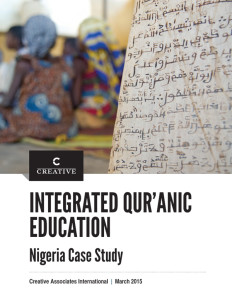[vc_row full_width=”” parallax=”” parallax_image=””][vc_column width=”1/1″][vc_column_text]
Integrated Qur’anic Education: Nigeria Case Study
By JC Finley
[/vc_column_text][/vc_column][/vc_row][vc_row full_width=”” parallax=”” parallax_image=””][vc_column width=”2/3″][vc_column_text]The goal of universal basic education for Nigeria is challenging. A significant number of children – more than 9.5 million – aren’t enrolled in formal schools, though they attend Qur’anic centers. These centers often lacked regulation and funding, leading to substandard instruction and low retention.
 Nigeria plans to overhaul these Qur’anic (Almajiri) schools to meet education standards while retaining their faith-based tradition. The plan centers on integration: incorporating core subjects such as literacy and math, along with vocational training, into the Qur’anic curriculum.
Nigeria plans to overhaul these Qur’anic (Almajiri) schools to meet education standards while retaining their faith-based tradition. The plan centers on integration: incorporating core subjects such as literacy and math, along with vocational training, into the Qur’anic curriculum.
Building on the Nigerian government’s existing policy framework and in partnership with local NGOs, the U.S. Agency for International Development launched and funded the Northern Education Initiative, which was implemented by Creative Associates International.
“Central to NEI’s approach was to collaborate with host-country counterparts to identify the right starting point and strategy and include built-in mechanisms that could be tailored to states’ needs and entry points,” wrote Creative Senior Associate Semere Solomon wrote in his assessment of the project. “The NEI approach encouraged simplicity, maximum utility, and cost-effectiveness consistent with the country’s ability to sustain the system.”
In “Integrated Qur’anic Education: Nigeria Case Study,” Solomon, an expert in education and civil society programs, examined the nature of non-formal schools and assessed the lessons learned and best practices of the Northern Education Initiative.
The case study identifies strengths of the Integrated Qur’anic Education, including the importance of public outreach and program advocacy within the community, as well as areas for future consideration, such as expanding integrated vocational training.
Collaboration at all levels, especially within the community, was integral to the success of the Northern Education Initiative. “Community coalitions act as the glue that binds community decision makers together, providing a venue for discussion – and action.”
The model was implemented in 80 non-formal schools in the States of Bauchi and Sokoto in 20 Local Government Education Authorities (LGEAs)
Click here to read the case study in full.[/vc_column_text][/vc_column][vc_column width=”1/12″][/vc_column][vc_column width=”1/4″][vc_widget_sidebar sidebar_id=”sidebar-primary”][/vc_column][/vc_row]